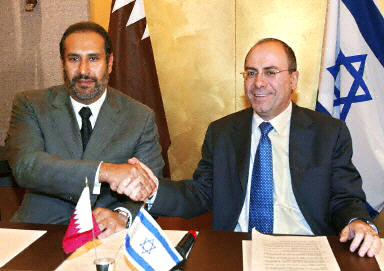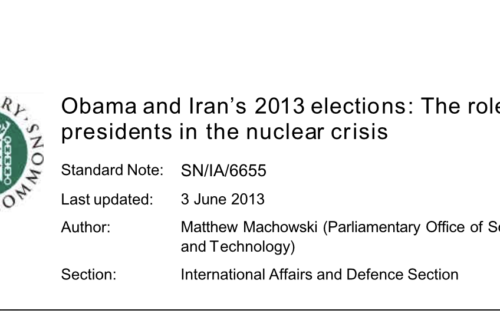Qatar-Israel Relations: A Historical Overview
 |
|
Sheikh Hamad bin Khalifa Al Thani, Qatar’s Emir meeting
Israel’s PM Ehud Olmert in Paris, Jul 2008. Source: LIFE |
Qatar, the “rising start” of Middle Eastern diplomacy, has been engaged in its bilateral relations with the State of Israel for exactly 20 years now, since the former Emir Sheikh Khalifa bin Hamad Al Thani expressed his support for the Arab-Israeli peace conference in Madrid in 1991. Its bold commitment to actively engage in regional diplomacy and raise Qatar’s position internationally contributed to a slow but steady process of normalisation of the interstate relations between the two countries, Qatar becoming de facto the first GCC state to grant official recognition to Israel by establishing mutual business and trade relations in 1996, when the first Israeli Trade Office in the GCC opened in Doha following a visit by the then Israeli Prime Minister Shimon Peres.
|
Tzipi Livni, Israel’s FM meets Qatar’s Emir, Apr 2008. Source: MEMRI
|
Qatar-Israel relations suffered another setback as an effect of the Al-Aqsa Intifada in 2000 that led to massive protests against the Israeli state all throughout the Middle East, including Qatar. The Qatari authorities did not refrain from harsh criticism of their Israeli counterparts and successively turned down Ehud Barak’s request to visit the emirate, a move that constituted a sign of support for the popular discontent with Israel but did not lead to any conscious policy change; Sheikh Hamad eventually met Barak at the UN Millennium Summit in September 2000. In the run-up to Doha’s Organization of the Islamic Conference (OIC) meeting in November 2000 Qatar’s continuous engagement with the Israelis caused a major political row with Saudi Arabia, Iran, and other states. Finally, succumbing to various regional pressures Qatar announced the closure of the Israeli office in Doha on 9th November 2000, however further secret meetings between the two states did take place and the unofficial co-operation continued.
 |
|
Shimon Peres, 9th President & former PM of Israel
visits Georgetown University in Qatar, Mar 2007 |
Qatar’s non-permanent representation at the UN Security Council (UNSC) in 2006-7 supported by the Israeli authorities, and its effective assistance offered to Lebanon during the 2006 Lebanon War revealed another important aspects of Qatari political behaviour in the face of changing regional circumstances. Despite being a vocal advocate of dialogue between Israel and the official Lebanese government, Qatar maintained dialogue with Hamas and Hizbullah representatives, a position that was disconcerting not only to Israel but also Saudi Arabia and Kuwait. Additionally, Qatar abstained from the vote on Resolution 1757 (May 2007), which called for international tribunal to investigate the Rafiq Hariri assassination, a move that raised a few eyebrows in Washington. Following the eventual ceasefire and successive 18-month long political deadlock in Lebanon, which originated in their Parliament’s inability to elect a President, Qatar; arguably due to its neutrality and the ability to engage politically with numerous political players on an equal footing; emerged a triumphant regional peace broker that helped to strike a much-needed, yet for long seemingly improbable power-sharing agreement.
 |
|
Sheikh Hamad b. J. Al Thani, Qatar’s PM & Foreign Affairs Minister with Silvan
Shalom, Israel’s Vice-PM & Minister for Regional Development in Paris, 2003. |
More recently, however, in a yet another interesting shift in the Qatar-Israel relations, Qatari Prime Minister Sheikh Hamad bin Jassim Al Thani is believed to have held secret meeting with his Israeli counterpart Benjamin Netanyahu in London earlier this month. As indicated by various media reports Qatar has an eye to future LNG sales to Israel. Due to recent unrest in Egypt, Israeli imports of gas from that country have been largely severed and it wouldn’t be surprising if the Qataris wanted to fill that gap by exporting their LNG to Israel, even below market rates as some indicate.


